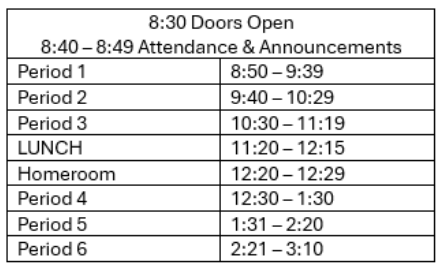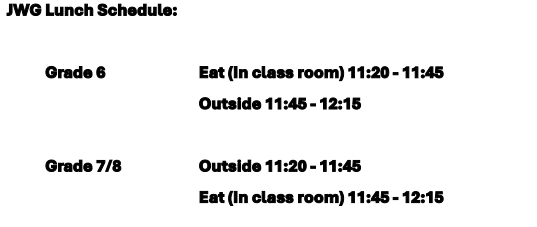Policies
School Operations
School Day

Student Expectations
Alcohol and other Drug Use by Students
The use or possession of alcohol and/or any other drug prior to or at school or any school sponsored activity is prohibited. ()
Code of Conduct
The purpose of the 糖心Vlog Code of Conduct is to promote a healthy school culture where high levels of achievement occur within a positive school environment. River East Transcona School Division believes that everyone has the right to be treated with dignity and respect.
Dress Code
Students shall dress in a manner that is appropriate for a learning and working environment.()
Electronics
Electronic devices are strongly discouraged. The school and the division as per policy, JICJ, assume no responsibility in any circumstance for the loss, destruction, damage or theft of any electronic communication device. These devices are not permitted or be used in the school or school grounds at any time. ()
Student Lunch Hour Expectations

• Students will remain in their classrooms while eating their lunch.
• Students will talk in a reasonable tone and volume.
• If students choose to leave (off school property) during the lunch hour, they may return to the building at 12:15 when lunch hour is over.
Health & Safety
Managing Allergies
What is an allergy?
When a person has an allergy, their immune system reacts to normally harmless substances such as food, drugs, chemicals or other allergens. Allergic reactions can vary from mild to severe to life threatening and can involve one, two or more body systems.
What is Anaphylaxis?
Anaphylaxis is an acute, life-threatening allergic reaction. Exposure to certain foods, medications ( including penicillin), insect sting venom and even cold air and exercise can cause it. When experiencing a full-blown anaphylactic reaction, the body goes into shock, blood pressure drops, the throat closes and breathing stops.
This year as in the past, there are several students (and staff) with life threatening allergies in the school. Contact with even a tiny amount of an allergen can cause a severe reaction.
Please refrain from sending the following food products to school; peanuts, nut products, eggs and shellfish. John W. Gunn is also a scent free facility and we would appreciate it if you would make a conscious effort to refrain from using scented products.
Nutrition Policy
Rational:
JWG recognizes that children need healthy food and physical activity for growth and development. The school will teach the principles of healthy eating according to the Manitoba School Nutrition Handbook (2006) and the Canada Food Guide. The staff will work with the home and community to model and incorporate these principles by promoting nutritious food choices in the canteen, vending machines, fundraising events, classrooms, and common areas. This policy does not impact on lunches, snacks, etc., which students and staff members bring from home for personal consumption.
Policy:
Commencing with the 2007/2008 school year, food provided by our school and its affiliates will be based on guidelines provided by the Manitoba School Nutrition Handbook (2006) and the Canada Food Guide.
School vending machines will offer food and beverages consistent with Canada’s Food Guide to Healthy Eating.
Every day food items available for sale or distribution at the school will not contain high levels of artificial trans fats. Download .
- Although healthy foods will be promoted for daily consumption, as well as on celebration days, this school will recognize the need to be flexible.
- Foods and beverages sold or made available at school for lunch, canteen and snack programs will be selected from the “Foods to Serve Most Often” or “Foods to Serve Sometimes” lists and will emphasize vegetables and fruit; lower fat white and chocolate milk; whole grain products; lean meats; foods prepared with little or no fat; and foods low in salt, sugar and caffeine.
- The school and its affiliates will support healthy food choices by providing affordable, nutritious food. Foods with maximum and moderate nutritional value sold in school will be priced as close to cost as practical.
- The school will investigate fundraising options that do no rely on the sale of non-nutritious foods.
- Recognizing the importance of role modeling in promoting healthy eating, teachers, administrators and school staff should act as role models to promote healthy eating within the classroom and school environment.
- Foods made available at the school or school sponsored events will support students and staff with food related health concerns.
- The school will emphasize the use of reusable containers, recyclable materials and the promotion of waste free lunches.
- The school will try to use local products first, where possible.
Download .
 John W. Gunn Middle School
John W. Gunn Middle School